- Home
- A. S. King
The Dust of 100 Dogs
The Dust of 100 Dogs Read online
The Dust of 100 Dogs © 2009 by A.S. King
All rights reserved. No part of this book may be used or reproduced in any matter whatsoever, including Internet usage, without written permission from Flux, except in the form of brief quotations embodied in critical articles and reviews.
As the purchaser of this ebook, you are granted the non-exclusive, non-transferable right to access and read the text of this ebook on screen. The text may not be otherwise reproduced, transmitted, downloaded, or recorded on any other storage device in any form or by any means.
Any unauthorized usage of the text without express written permission of the publisher is a violation of the author’s copyright and is illegal and punishable by law.
This is a work of fiction. Names, characters, places, and incidents are either the product of the author’s imagination or are used fictitiously, and any resemblance to actual persons, living or dead, business establishments, events, or locales is entirely coincidental. Cover models used for illustrative purposes only and may not endorse or represent the book’s subject.
First e-book edition © 2010
E-book ISBN: 978-07387-2255-9
Book design by Steffani Sawyer
Cover design by Gavin Dayton Duffy
Cover image © Digital Vision/PunchStock
Flux is an imprint of Llewellyn Worldwide Ltd.
Flux does not participate in, endorse, or have any authority or responsibility concerning private business arrangements between our authors and the public.
Any Internet references contained in this work are current at publication time, but the publisher cannot guarantee that a specific reference will continue or be maintained. Please refer to the publisher’s website for links to current author websites.
Flux
Llewellyn Worldwide Ltd.
2143 Wooddale Drive
Woodbury, MN 55125
www.fluxnow.com
Manufactured in the United States of America
To Topher. Until the end of time.
Live it up, live it up, live it up, live it up!
Robert Nesta Marley
Imagine my surprise when, after three centuries of fighting with siblings over a spare furry teat and licking my water from a bowl, I was given a huge human nipple, all to myself, filled with warm mother’s milk. I say it was huge because Sadie Adams, my mother, has enormous breasts, something I never inherited.
When I was born into a typical family in Hollow Ford, Pennsylvania, in 1972, my life was finally mine again. No more obeying orders from masters, no more performing silly tricks, and no more rancid scraps to eat. Within seconds of my birth, I was suckling like no other child in the local maternity ward, in order to grow strong quickly and return to a life cut short by the blade.
A puppy can walk and wander and whine from the minute they leave the amniotic sac. There is a freedom in that, which I learned to appreciate during those first years as a human again. Lying on my back for hours in a crib, wearing a diaper, and drooling made me feel like an idiot. I first tried to walk again at five months old and promptly fell over onto the linoleum floor, wailing from pain and frustration.
I was the youngest of five children born to Sadie and Alfred. Being the last, there was no wonder for them in my first steps or mutterings, and only a sigh of relief when I started to use the toilet by myself.
I don’t know if my parents saw it then, but they certainly noticed later that I was completely different from other children. When I first began talking, I sometimes spoke of places I’d never been, and they would look at me, confused. When I started school, my kindergarten teacher arranged a meeting with them and asked where I’d gotten so much knowledge of history and language. They shrugged and figured I was going to be the genius in the family—so I didn’t let them down.
In all fairness, they needed a genius. As I grew up, I started to notice that life in the Adams household was less typical than it appeared on the outside. My father suffered horribly from the side effects of his tour in the Vietnam War and my mother had never recovered from her childhood. Their lives had been lived on the edge of poverty and emotional instability. In me and my superhuman intelligence, they saw a way out of their troubles and shame, and so they rarely questioned any of it.
But after a meeting with my first grade teacher, they had to sit me down and ask a few things.
“Saffron, how did you know so much about the second world war?”
“I guess I saw it on the TV,” I answered, trying not to sound coy.
My father frowned. “You couldn’t have seen it on the TV. They don’t say that much on the TV.”
“Must have read it in a book, then.”
“Sweetie, we don’t have any books like that. Did you read it somewhere else?” my mother cooed.
“I must have.”
“Hmmm.”
“Saffron, we know you’re a very clever girl, but do you think there’s a way you could stop showing off in class? Mrs. Zeiber is concerned that you’re making the other children feel bad,” she said.
“Then why don’t they put me in a higher grade?” I didn’t like Mrs. Zeiber, but now I had reason to like her even less. I pictured myself liberating her eyeball from its socket and tossing it onto the merry-go-round in the first grade recess area.
“But we thought you liked being in Mrs. Zeiber’s class.”
“I do, but I’m pretty bored. I’m sick of counting to a hundred,” I whined.
They looked at me, and shrugged at each other. Two weeks later, after winter break, I was enrolled in the district’s gifted program—the ultimate place for showing off knowledge that no other first grader could have. I blabbered about everything—the goings-on in the Truman White House, the main tenets of Hinduism, the political complications of Central Africa. My peers envied me, even the teachers envied me. I was like a miracle kid or something, and people started to talk.
The next year, I realized that life as Saffron Adams would have to be far more inconspicuous. I couldn’t go around claiming to be a genius, and I couldn’t go telling stories from history that I shouldn’t know yet. I guess I realized that the more I said, the more chance I had of ruining everything I was working toward.
It was then, in 1980, the year I turned eight years old, that I forged my plan to return to the Caribbean Sea. Most of the other kids in my class were toying with being rock stars or President of the United States, but I had something much more appealing in mind. Finally done with my one hundred lives as a dog, I would one day reclaim my jewels and gold, hold them close to my heart, and live happily ever after.
So from that day forward, in order to seem my age when people asked me what I wanted to be when I grew up, I answered accordingly.
“I want to be a pirate,” I would say. And they would smile and think, “Isn’t she sweet?”
Growing up where I did, it was kind of funny for a kid to want to be a pirate, I guess. There wasn’t a spot of water for miles. Three hundred miles, to be exact, to the New Jersey shoreline. My mother liked it that way. When we took our week-long vacation in the summer, we always went west or north or south, but never east.
“I’ve spent enough time near the sea for this life,” she would say. But still, all my sister’s friends spent their vacations walking the boardwalk eating ice cream and saltwater taffy, while we took historical outings. Sometimes, if we would whine too much about the mosquitoes or the boring Civil War battlefields of Virginia, she would scare us with lies: “Children your age go missing every summer on the boardwalk,” or “I won’t have you running around half naked in
front of old perverts.” She would turn her eye to my teenaged sister and whisper, “Especially you, Patricia.”
It wasn’t until I got older that I learned what she had against the sea.
Once Patricia had moved out and Darren was packed for college, my mother began to need me more. I used to talk to her on the rare nights when, feeling lonely, she would sit at the kitchen table with a bottle of Irish whiskey. On a night in 1985, she told me what happened to her family back in the 1950s. I was thirteen.
Her brother Jim had called from Ireland that night, which he often did since he’d found us six years earlier. They’d talked for about an hour and, when my mother hung up the phone, she turned off the lights in the kitchen and lit a candle. She fetched a glass from the cupboard and sat down with her bottle. (She would sip minute amounts of drink and never get tipsy, but seemed to get some sort of familiar relief from it.) Teary eyed, she made me sit down, and poured herself another short measure.
“Saffron?”
“Yeah?”
“Do you know the story of my brother Willie?” My mother spoke in a mixed Irish-English accent, the kind that sounds like a question all the time.
“Willie?” I asked, having never heard her mention him before.
“The second youngest?” She pulled her fattening fingers through her black mop of dyed hair, which seemed more like a wig than real hair. Maybe it was the stark color or the three-day-old hair-spray consistency that made it seem fake, but somehow it suited her. She pulled her bangs from her face and tried to tuck them behind her ears.
“I don’t think you ever told me about him,” I answered.
She got up from the table and poured me a cup of weak tea from the hot kettle. “He was some little dote, that one. I think it’s time you knew.”
“Is that what you were talking about with Uncle Jimmy?”
“That and the rest,” she answered, sighing and sitting back down. Her eyes had sunk deep into her head recently. I noticed near-black circles hidden behind her out-of-fashion 1970s glasses. She looked a lot older than forty-one, which was how old she told us she was. Her stray bangs continued to make her face itch, and she continued to try to plaster them back somehow.
“I thought there were eight of you,” I said, “but I never heard of Willie.”
“There were nine of us—well, ten if you count the baby that died our first winter out of Wexford town. Four girls and five boys. Poor as this,” she said, holding out her empty hand. “Willie was the most stubborn of all of us. He’d do whatever my Mum told him not to.”
I nodded.
“And you know, my father was an awful man who sold every last scrap we had for the drink.” She wiggled the bottle. “This shite. That’s how the nuns got my sisters and me. That’s how the brothers got your Uncle Jimmy and the boys. Willie never made it past the docks in Dun Laoghaire. He was drowned there, before we all got on the mailboat to England with my mother.”
I was doubting that my mother was sober at that point. She’d never spoken of her father so roughly before. “What do you mean, Willie ‘was drowned’? Like someone killed him?”
She nodded her head and continued her story, looking all the while at her glass and the Formica table. “Yes. Last I saw him he was crying, calling for our mum, and a nun was giving out, telling him to shut up. He must have talked back, because she slapped him and he ran to the edge of the dock.”
I stopped sipping from my cup and sat completely still, wondering what she would say next.
“When he jumped, I don’t know. I saw him from the stairway to the boat—thrashing around for a few seconds and then going under. I tried to stop and go back down, but there were too many people. My mother watched from close by, but was stuck in the crowd the same as I was. I remember her yelling his name over and over. Before I knew it, I had lost all sight of my brothers and never saw them again, until your Uncle Jimmy came to see us in seventy-nine.”
“Didn’t anyone dive in after Willie?”
“No,” she answered, still looking at the table, now firmly holding her misbehaving bangs at the sides of her temples. “No one.”
“What did the other people on the dock do?”
“They just stood there. The nuns turned their back on him and told everyone to go back to what they were doing.”
“Wow,” I answered, trying to act as if I had no idea life could be so cruel. But I had seen worse. I had done worse. I had done far worse.
“That’s just how things were, pet. My mother had signed the papers, and we became property. My knees were bloody for five years, slaving for those nuns in the south of England. I never saw my mother again and only heard she was dead, surely, when Jimmy came.”
“How old was Willie when he died?”
“Four or five.”
“How did they get away with that?”
“They got away with whatever they wanted to,” she said matter-of-factly. “Still do.”
“Is that why you left Ireland?”
“No,” she answered quickly. “My mother would have never left Ireland if she didn’t have to. But since my Da left, she was desperate. We lived for a few months on land belonging to old neighbors in Kilkenny—that’s when the nuns caught up with us and told my Mum that we’d all have a better life in England. My mother refused. After a few weeks, the nuns came back again. ‘Ten healthy children and you won’t take the trip to England? Why not?’ they asked her. She said she couldn’t and wouldn’t go—she was an Irish woman and belonged to Ireland.”
I nodded. This was a feeling I could relate to—more than my own mother would ever know. Maybe more than my own mother had ever herself felt.
“You know, in the autumn, those nuns brought us milk and bread every single week. But once winter came, the deliveries stopped. By Christmas, two of the kids were so sick from hunger and cold they had to go to the local children’s infirmary. That’s when baby Avril died. After Christmas, the nuns came back and my mother agreed that we would all go to England, where there were free houses for people like us and good jobs. Ha!”
She poured a little whiskey into her glass.
“Ha!” she repeated. “Good jobs. Free houses! What a fool she was to believe it! Although I don’t think she really did. Then to see little Willie drown like that? I think she must have pretended that it was some other mother’s boy. That it wasn’t Willie. That was how I got by, anyway,” she whispered, confession-like, as if it were a sin to pretend. “Any faith she had left would have been all for naught, had she seen us battered and worked like slaves, digging frozen ground for vegetables to feed ourselves! For Christ’s sake, it was 1958! But like the Dark Ages!”
As I sat patiently, my mother refilled my teacup and poured herself a last measure of whiskey. She patted the bottle and put it back into the cupboard by the sink.
“You know, it’s not just about Willie,” she started, “or the way they lied to us and used us. It was the fear—” She stopped and shook her head as if trying to believe this was really her story. I could tell she was beginning to find it difficult when she reached up and put her hand over her mouth for a moment, a sign she was holding back tears. She let her unruly hair fall back into her face and I heard her swallow.
“They’d do anything,” she finished, “just to get you to cry or misbehave. Anything to punish you with those damned hobnailed boots.”
“Is that why we don’t go to church?”
She nodded. I pictured myself disemboweling ruffian nuns.
“And that’s why we don’t go to the Jersey Shore?”
She nodded. I pictured myself dismembering beach perverts.
I sat quietly for a minute while she stared into space and drew strength.
“Did you finish your homework?”
“No.”
“Well, what are you doing sitti
ng here talking to me when you haven’t finished your homework?” She fitted a raggedy old purple headband over her forehead and pulled it back to solve her hair problem.
“I—”
“You know that the only way out of here is an education. Don’t start getting lazy now, love. You have so much potential.”
“I know,” I answered, still listening to her echo. (Only way out. Only way out.)
She got up and turned on the kitchen light and ran some hot water into the sink for the dishes. “I’ll see you later, love.”
When I went back to my room (now my own room, for six whole months since Patricia moved out), I lay on my bed and sobbed softly to myself for my Uncle Willie. It seemed—even though I knew about how bad the world could be—that I still had no control over hormones and the adolescent urge to cry my eyes out over the oddest things.
But I wasn’t just crying over an uncle I never knew. I was crying about everything a three-hundred-year-old brain would cry about. Like how annoying it was to be surrounded by spoiled, twentieth-century thirteen-year-old boys and girls all day, by twentieth-century grown-ups with no idea about what was really going on, who were caught up in Dynasty soap opera plots, in Reaganomics, in stuff that really didn’t mean anything to anybody. I wanted to kill them, and felt simultaneously sorry for them. They were a galleon of starving sailors, and I wanted to sever each one of them in half for being so stupid.
But thirteen-year-old boys and dumb people and my long-dead, never-known Uncle Willie were not what the tears were really about. As I lay there, on the new pink bedspread we bought at Kmart the weekend before, I reached over my schoolbooks for a tissue and sobbed the hardest when I thought of what my mother had said to me when I left the kitchen: “Don’t get lazy now, love. You have so much potential.”
It was all about my potential. Since I became girl genius in first grade, I seemed to signify some sort of escape for her. She was so into education and my being smart that I knew there was no way to avoid college—which I already knew would be a complete waste of my time.

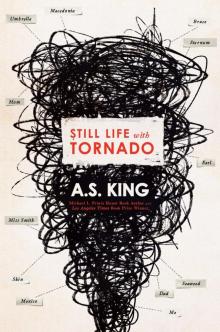 Still Life With Tornado
Still Life With Tornado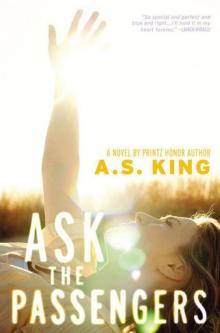 Ask the Passengers
Ask the Passengers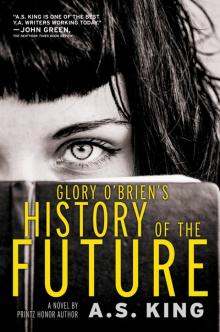 Glory O'Brien's History of the Future
Glory O'Brien's History of the Future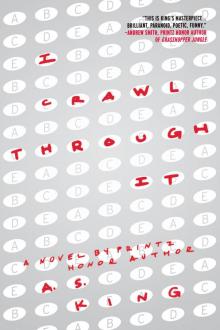 I Crawl Through It
I Crawl Through It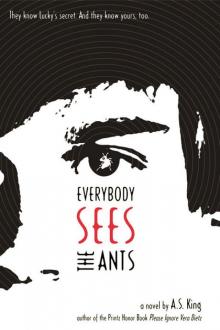 Everybody Sees the Ants
Everybody Sees the Ants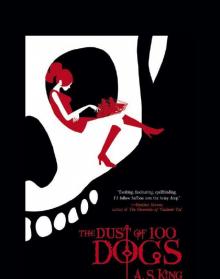 The Dust of 100 Dogs
The Dust of 100 Dogs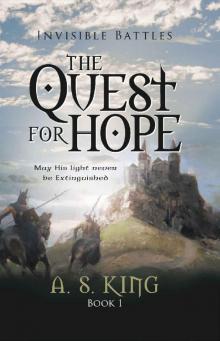 The Quest for Hope | Christian Fantasy Adventure (Invisible Battles Book 1)
The Quest for Hope | Christian Fantasy Adventure (Invisible Battles Book 1)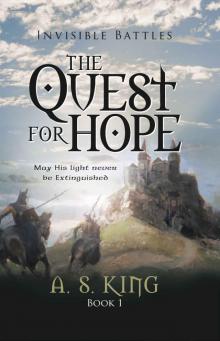 The Quest for Hope | Christian Fantasy Adventure
The Quest for Hope | Christian Fantasy Adventure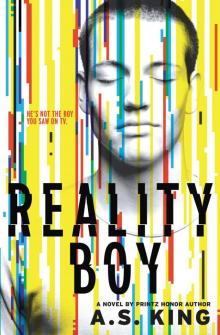 Reality Boy
Reality Boy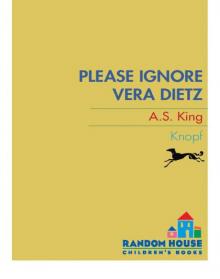 Please Ignore Vera Dietz
Please Ignore Vera Dietz